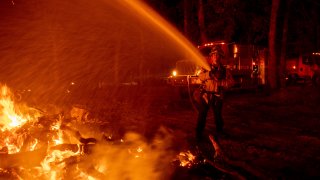
Officials have lifted all evacuation orders after crews made great progress corralling a wildfire that was started by a woman last week and has destroyed dozens of homes near Shasta Lake in Northern California, authorities said Wednesday.
The Fawn Fire was 75% contained after destroying 185 homes and other buildings in an unincorporated area north of the city of Redding, the California Department of Forestry and Fire Protection said.
Alexandra Souverneva, 30, is being held at Shasta County Jail after being charged with felony arson to wildland with an enhancement because of a declared state of emergency in California, prosecutors said. Souverneva pleaded not guilty.
The Fawn Fire has charred more than 13 square miles (34 square kilometers) of heavy timber.
Get a weekly recap of the latest San Francisco Bay Area housing news. Sign up for NBC Bay Area’s Housing Deconstructed newsletter.
It’s the latest destructive blaze to send Californians fleeing this year. Fires have burned more than 3,075 square miles (7,964 square kilometers) so far in 2021, destroying more than 3,000 homes, commercial properties and other structures.
Those fires include a pair of big forest blazes burning for more than two weeks in the heart of giant sequoia country on the western slope of the Sierra Nevada. More than 1,700 firefighters battled the KNP Complex Fires, which covered 76 square miles (196 square kilometers) by Wednesday. The blaze burning in Tulare County was only 11% contained.
Half of that land scorched this year — 1,505 square miles (3,898 square kilometers) — was burned by the Dixie Fire across five counties in the northern Sierra and southern Cascades region. It is the second-largest fire on record in California and has destroyed more than 1,300 homes, businesses and other structures. It was 94% contained as of Wednesday.
California
Pacific Gas & Electric has acknowledged that its equipment may have played a role in sparking the blaze on July 13. Fire officials estimate the blaze will be fully contained by Oct. 30.
A historic drought in the American West tied to climate change is making wildfires harder to fight. It has killed millions of trees in California alone. Scientists say climate change has made the West much warmer and drier in the past 30 years and will continue to make weather more extreme and wildfires more frequent and destructive.



